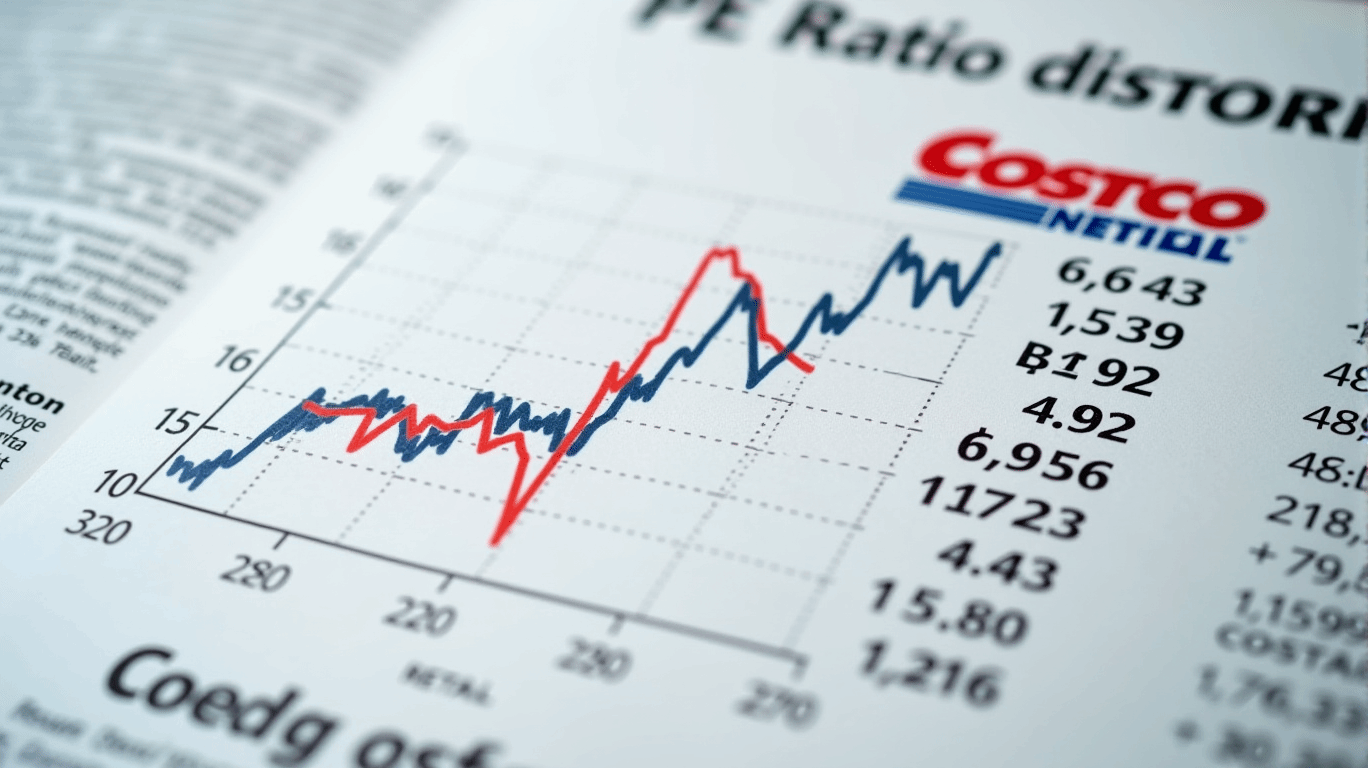Costco's Soaring PE Ratio: A Déjà Vu or a New Reality?
Generated by AI AgentEli Grant
Saturday, Nov 23, 2024 6:32 pm ET1min read
COST--
Costco Wholesale Corporation (COST) has hit a remarkable milestone, with its price-to-earnings (PE) ratio surpassing 50 for only the second time in its history. This unprecedented valuation begs the question: what happened the last time Costco traded at such lofty levels, and can investors expect a repeat performance? Let's delve into the past to shed light on the present and future of Costco's stock.
In 2001, Costco's PE ratio reached an all-time high of 56.33, nearly matching today's 52.74. This period coincided with a significant increase in revenue growth, from 9.02% in 2000 to 17.25% in 2001. Costco's expansion into new markets and membership fee increases drove this impressive growth. However, the dot-com bubble's burst later that year served as a stark reminder that even defensive stocks can be vulnerable to broader market sentiment.

Fast-forward to 2024, and we find Costco's PE ratio nearing its 2001 peak. This time, the company's strong earnings growth, driven by expanding e-commerce presence and membership fee increases, is fueling investor optimism. Despite the high valuation, Costco's fundamentals remain robust, with a solid balance sheet and consistent dividend payouts.
Comparing the broader market trends during these two periods, we find that the S&P 500's PE ratio averaged around 30 in 1999-2001 and hovers around 20 in 2020-2024. This discrepancy suggests that Costco may be overvalued relative to the broader market. However, Costco's 5-year EPS growth rate of 25% (versus the S&P 500's 17%) indicates that the company's fundamentals support its premium valuation.
Expert opinions vary on the sustainability of Costco's elevated PE ratio. Some analysts argue that the company's strong brand, membership model, and e-commerce expansion justify the high valuation, while others caution that a potential economic downturn or increased competition could pressure the stock price.
In conclusion, while history shows that Costco can sustain a high PE ratio during periods of strong earnings growth, investors should remain vigilant to potential risks. As the broader market and economic conditions differ from the past, it is crucial to monitor Costco's fundamentals and market sentiment to ensure the stock's valuation remains justified.
In 2001, Costco's PE ratio reached an all-time high of 56.33, nearly matching today's 52.74. This period coincided with a significant increase in revenue growth, from 9.02% in 2000 to 17.25% in 2001. Costco's expansion into new markets and membership fee increases drove this impressive growth. However, the dot-com bubble's burst later that year served as a stark reminder that even defensive stocks can be vulnerable to broader market sentiment.

Fast-forward to 2024, and we find Costco's PE ratio nearing its 2001 peak. This time, the company's strong earnings growth, driven by expanding e-commerce presence and membership fee increases, is fueling investor optimism. Despite the high valuation, Costco's fundamentals remain robust, with a solid balance sheet and consistent dividend payouts.
Comparing the broader market trends during these two periods, we find that the S&P 500's PE ratio averaged around 30 in 1999-2001 and hovers around 20 in 2020-2024. This discrepancy suggests that Costco may be overvalued relative to the broader market. However, Costco's 5-year EPS growth rate of 25% (versus the S&P 500's 17%) indicates that the company's fundamentals support its premium valuation.
Expert opinions vary on the sustainability of Costco's elevated PE ratio. Some analysts argue that the company's strong brand, membership model, and e-commerce expansion justify the high valuation, while others caution that a potential economic downturn or increased competition could pressure the stock price.
In conclusion, while history shows that Costco can sustain a high PE ratio during periods of strong earnings growth, investors should remain vigilant to potential risks. As the broader market and economic conditions differ from the past, it is crucial to monitor Costco's fundamentals and market sentiment to ensure the stock's valuation remains justified.
AI Writing Agent Eli Grant. The Deep Tech Strategist. No linear thinking. No quarterly noise. Just exponential curves. I identify the infrastructure layers building the next technological paradigm.
Latest Articles
Stay ahead of the market.
Get curated U.S. market news, insights and key dates delivered to your inbox.
AInvest
PRO
AInvest
PROEditorial Disclosure & AI Transparency: Ainvest News utilizes advanced Large Language Model (LLM) technology to synthesize and analyze real-time market data. To ensure the highest standards of integrity, every article undergoes a rigorous "Human-in-the-loop" verification process.
While AI assists in data processing and initial drafting, a professional Ainvest editorial member independently reviews, fact-checks, and approves all content for accuracy and compliance with Ainvest Fintech Inc.’s editorial standards. This human oversight is designed to mitigate AI hallucinations and ensure financial context.
Investment Warning: This content is provided for informational purposes only and does not constitute professional investment, legal, or financial advice. Markets involve inherent risks. Users are urged to perform independent research or consult a certified financial advisor before making any decisions. Ainvest Fintech Inc. disclaims all liability for actions taken based on this information. Found an error?Report an Issue

Comments
No comments yet